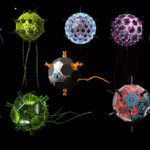Free Original Storyworld Ideas, Part 9: Black Box Interchangeable Brain
This post combines four different personal blog posts I did on science fiction story settings that relate to the human brain. All of them play along with the idea that the brain is the center of consciousness (as many people believe) and when manipulation of the brain becomes advanced enough, life will completely change for human beings (if that should ever happen in the real world). These ideas include what we’ll call the Revive idea which relates to a “black box” for the brain, which would allow a person to be re-booted in case of death. But if the black box can be swapped between humans, then brains would become interchangeable, so spending time in another human’s body would be possible–perhaps making swapping out bodies like buying a new car. But if that were possible, then it might be possible to manipulate the inputs of what goes into the brains, allowing what I called “modular brains,” which receive data the human body was never designed to do. But if it were possible to swap out inputs, some people would want to re-live moments of famous people or play video games etc from the point of view of a body which was never actually theirs–we’ll call that the I Live You Very Much idea.
These ideas all have various forms of science fiction antecedents. One of the best-known today is the TV series Altered Carbon, which has a lot in common with my ideas about brains being interchangeable (though I haven’t watched the series myself, I’m told that’s what it does). But I did first blog this idea in 2012…Altered Carbon came six years later. Though there’s even earlier sci fi precedents for this kind of thing (and fantasy precedents for that matter). But combining them all together does wind up being uncommon, if not actually unique.
Note that talk of swapping out brains will raise in some readers’ minds questions about the soul and also about eternal life. I’ll briefly address some of these concerns near the end of this post. But first, let’s review my ideas on swapping out and altering brains in order:
Revive
Extra lives used to be a standard feature in video games even earlier than Pac Man and still remains a feature of some video games even today. Some corner of my brain wondered how that would work exactly, which inspired an idea for a new story setting.
In Revive, which I think would be more appropriate as an actual video game than a work of GameLit (though it could easily be both), a future exists where medical technology is so advanced that it’s possible to bring people back from the dead on a routine basis. This would be based on massive brain reconstruction after death and sophisticated chips implanted in the brainstem that record a person’s mental status at the time of death–a sort of “black box” for the human mind.
People who could afford the regeneration services could be routinely brought back to life–though a medical technology as advanced as this would probably be able to keep the very wealthy alive forever–that is, keep them from death of natural causes. Death would only come as a result of accidents or by some sort of violence.
The world of Revive would be violent in the extreme. With no more fear of death, ancient ideas of individual honor being resolved by personal combat would come back to life. The very rich would dominate the rest of society by their immortality–physically dominate it–acting with a lordly brutality that has a parallel in some vampire stories.
The main character I’d want to write would not be super rich–he’d be an elite soldier who is revived by the government on a regular basis to preserve his enormous knowledge of combat and the political situation. This character could have many possible motivations. One could be to maneuver through the political and personal combat machinations of the dominant families of the very rich with an eye to right the death of one of his friends.
Perhaps this type of story world could feature a war between a religiously-motivated underclass, led by a man like a futuristic Oliver Cromwell, who constitute an army of mortal soldiers, “roundheads” of the future. They’d have many disadvantages, but their religious fervor could give them a boldness in the face of death even greater than the near-immortals. Perhaps they’d fight against the godlike immortals who spread fear over Planet Earth and any other realms where the humans in this story would roam…
The Interchangeable Brain
The “black box for the brain” idea I discussed in my suggested video game concept (here’s a link to the original post) carries with it some interesting implications:

The Modular Brain
This permutation of the idea of altering brains originated in me wondering if humans like to kiss because the mouth is the part of the face, which (in my wild speculation) is the part of the body most closely associated with our conscious self, the part of the mind where we mentally abide, our own internal living room as it were (as if the face, including vision, were the primary window the conscious mind uses to connect to the world, whereas other means are more distant, like windows in a basement you can access but have to move your vantage point to do so). As opposed to our subconscious, which is perhaps more connected to inner parts of your body, like your internal intestines or kidneys. Things you can feel but normally are not aware of unless you are in pain, like your breathing or how your knee is operating, would occupy a borderline between the conscious and unconscious mind.
As I was thinking about this, an image of old Nintendo style game cartridges plugged into a human skull popped into my head. What if it were possible to have a living human being with a modular brain, a plug & play brain system?
This is would be just one aspect of being a cyborg and of course being a cyborn is not original to me. Perhaps possibly though it is original to think of writing a science fiction story in which different parts of the brain could be mixed on a modular basis. So I could match the conscious mind of a human being with the brain control to operate the limbs of an octopus. Or horse. Or an alien creature. Or a story could flip the subconscious so it operates machinery, while the conscious self perhaps believed it was still fully human. Or I could plug an alien conscious mind into human limbs…Etc.
Or more narrowly, what if you could pick eagle eye input, bat sonar, and an elephant nose input to be fed into one brain? And the brain parts would be adapted in this form of plug & play to be able to process these unusual inputs and harmonize them into the whole system? Like a sort of mental USB that in these examples, connected to exterior sensors?
What if wholly internal thought processes were subject to his same modularity? So you could adopt Vulcan logic as a plug-in and swap it out for a Klingon battle mindset when you needed it? (The possibilities seem endless.)
What if a story featured fine-tuning and customizing your own brain as a major industry of the future?
I Live You Very Much
So if you could fine-tune your brain and capture brain memories, what if an industry sprung up around people selling their life experiences? (This idea, by the way, was inspired by a friend commenting that her spell check corrected her writing “I love you very much” to “I live you very much”…)
Imagine a story setting in which you could assume the body of another person. Any other person, living or dead, complete with their memories.
Something like my idea has been done in a variety of ways in the past. An original Star Trek episode featured a machine that was able to transfer a woman’s inner self, her soul if you will (though the episode didn’t use that term) into Captain Kirk’s body and vice versa. Later, in the movies, Doctor McCoy carries around Spock’s Katra, the Vulcan equivalent to a soul (given to him in a mind-meld) prior to it being returned to a new version of Spock’s body.
Stories have even featured robot surrogates that a person can project their consciousness into. Or on a technologically simpler level,virtual reality projections have been proposed in which anybody could assume the shape of anyone or anything in a highly realistic digital projection that hits all of a person’s senses.
But let’s take what all these previous stories have done and develop their notions further. Imagine a story world in which a human being could be rapidly grown from DNA samples, (which sci fi has done numerous times). Then the brain of this new clone could be reprogrammed with a person’s mind (again, as stated above, this has been written before). But to take this a step further, imagine a world in which careful genetic research could reproduce the bodies of people no longer living. Then implant their brains with recreations of their memories based on what is known of that person from history–and then place a living person into that system. You would not be yourself in another body–your would literally be, as much as science could reproduce, an actual figure from history. Your very thoughts would be changed, merged with those of the person you entered.
Figures from history would be very popular for this sort of thing, but so would living celebrities. Imagine living celebrities getting paid high royalties for allowing people to copy their memories. So that strangers could merge their thoughts and inner selves into the bodies of the rich and famous.
Note this sort of procedure could be done in a way that isn’t a merger–it instead could be set up so the stranger would be just an observer in another person’s mind. Playing back past experiences as if a movie–but with everything there. Smells, thoughts, bodily urges, the works.
Couldn’t a story like this feature a Jurassic Park type setting of historical figures? Or make it possible to put a as realistic as possible Napoleon in a battle versus Genghis Khan versus Julius Caesar?
The ability to load yourself into historic or celebrity brains would allow unique opportunities of learning about the lives of fascinating people from the past and present. Though for the historic figures, a lot would depend on the types of memories loaded into a brain and what DNA was used to create a person. People like Jesus or Socrates would be highly controversial. Because for them only some thoughts and experiences are preserved by history and any direct relatives from which DNA could be extrapolated are long since gone. (Though Jesus might be somewhat slightly a teeny bit more controversial than Socrates…). There would have to be multiple versions with radically different characteristics for further-in-the-past or obscure historical figures.
In theory, the same sort of reproduction of the past could be done digitally, without actual growth of clones or recreating brains. But genetic systems–what I would call in a story using this idea, “wet modeling”–would develop a complexity that due to the Heisenberg Uncertainty Principle digits may never be able to reproduce. And even if totally realistic virtual reality were possible in some super-technological future and were as good as cloning, some people might just prefer “wet models” anyway. So in an imaginable future world with sufficiently advanced technology, “I live you very much” might be an actual thing.
What About Souls? And Mortality?
I’m offering this idea up for use by anyone interested in using it, but if I were to write this up myself, I’d be interested in aspects of the soul in such a story. Perhaps someone who was revived would never quite feel like himself or herself again. The difference perhaps would be mild, but perhaps would be profoundly disturbing.
Perhaps an attempt to make multiple copies of a brain would fail for mysterious, inexplicable reasons. Perhaps a single brain could be brought back–but for reasons the brain scientists in the story don’t understand, the copies are notably different from the original. (The reason would be there’s only one copy of a soul, which a story would imagine cannot be xeroxed…)
I’d also feature people who refuse to undergo “Revival” even though they can afford it, because they cling to the religious concept that humans are supposed to be mortal. Though emphasizing that even those who copy themselves would eventually die would also be important.
But let’s explore the theoretical possibility that the soul is at least partially a product of brain function. What if the soul really does come from the brain, but is immortal because God retains a copy of it in His memory? Like a heavenly “cloud” drive (pun intended) that backs us up at all times?
So as an alternative to what I suggested above about failed copies or not-quite-so revivals, perhaps a story could portray people coming back exactly as they used to be–or very close anyway. Again, not that I think such surgery will ever be possible, no matter how advanced medicine may become…
A Christian Motivation
The reason to tackle this sort of story as someone who has Christian convictions would be because it gives the opportunity to ask: “What is the difference between the contents of all a person’s memories and the soul? What does it really mean to be who you are? Is it possible to think radically different thoughts, ones you’d never thought before, and still be yourself when you’re finished?”
That leads to how I would carry out such a story. I’m make it so that radical alterations including merging your mind with another person’s mind would be filled with unexpected failures and unpredicted reactions. Even in such a super-technological world as the one I’ve imagined, God is the master of circumstances, not we human beings.
And I would say that thinking someone else’s exact thoughts, or experiencing the world as another creature even, even for a short time, would change who you are. There would be no going back to thinking the exactly same way as you had beforehand, not entirely. The Bible itself states in Proverbs and elsewhere that what people think reflects who they are.
Conclusion
So what are your thoughts on this mini suite of story ideas? What have you seen or read that’s similar? What ideas would you be interested in exploring?
(By the way, my podcast covering this same topic in different words is at: https://travissbigidea.podbean.com/e/free-original-storworld-ideas-part-9-the-interchangeable-black-box-brain/)









































This article reminded me a little bit of the Christ Clone trilogy where somebody clones Jesus from cells found on the Turin shroud.
Read the first paragraph, came down to post about Ghost in the Shell. Animated movie came out in 199?. Man, it would be a pity if they did a Hollywoodized version of that that lost all of what made the original awesome. That would suck, should that happen.
Also that idea about the same brain in multiple bodies has been done, in Ann Leckie’s Ancillary series. Very interesting, very well utilized.
Some transhumanist themes I’ve heard about are about the fragility of identity because identity is dependent on memory. GitS the movie had a whole bit about how a garbage disposal man was given false memories about a marriage and kid that were used to manipulate him into committing felonies. Or, as you mentioned, how no longer being in a body might impact the mind.
But there’s probably a whole slew of ones I’ve missed because transhumanist fiction isn’t on my radar so much.
**** flashfic time
I was born Oct 12, at 23 years of age. This was after 10 years of gestation inside the mind of one Tylar Artos Crossman, who had downloaded the classic memnov about a girl born with a genetic disorder who died at 19. It was one of those classics that are not actually popular, mostly kept afloat because of cultural inertia, that most people knew vaguely about but never read. Tylar picked it out of a list because it was one of the shorter ones. He didn’t like it.
But it was that novel that taught him about the concepts of a public mask created by the projection of others, and how that might be manipulated. It helped put words to the feelings he had when he was stereotyped as a creepy dweeb at 15.
If Tylar, as the parent who carried me and gave me a body, was my mother, then my father, the parent who gave a spark of essence, was that girl whose private blogs were reverse engineered into a memnov 125 years later, Iris Lena Sonno.
Iris was a depressed, cynical mess at 19, who excelled at post-graduate-level schoolwork because she had little else to do stuck in a wheelchair or in a hospital. She’d actually had more life experiences than Tylar, mostly lots of travel, for treatments, for enrichment, for fundraising drives for the foundation for her condition that paid for a great many opportunities her parents couldn’t afford, like all the traveling. So long as she could put forward the face of cheerful gratitude, buoyed by medication. The public wasn’t interested in who she was, they were interested in being sad and compassionate for thirty minutes and feeling like it had inspired them and enriched their lives.
Tyler had redone the memnov at 21and found it less boring but still plenty depressing and kinda tedious. To be fair, Iris would have thought him oblivious and kinda dumb.
But I date my birth as being distinct from my parents at Oct 12 because that was the day Tylar went to a museum exhibit about Iris that featured some of her artwork and he — I — felt differently. I remembered my father, but I still wasn’t my father.
The idea of a brain being removed and used for another purpose made the first season of Psycho Pass come to mind. It’s a dystopia series where a person’s mental and emotional state can be assessed to see if they are about to commit a crime so they can be eliminated beforehand. The law enforcement has guns they can point at people, and if its programming assesses that the person is a threat, it will shoot or at least give the officer permission to shoot. But one of the main antagonists is basically a psychopath(from what I recall) and can get around this system. Toward the end of the season, he’s approached by the robot thing that represents the system itself. The robot reveals the true nature of the system…that it’s basically this huge room full of psychopath brains that are utilized in the assessment and decision making abilities of the system. The idea being that the psychopaths are the only ones that truly have the capacity to assess the relevant data in an accurate, non biased way(which is only partly realistic, but that’s another discussion).
One reasons why many of the psychopaths would have opted to have their brain transplanted into the system was because it would give them a sense of immortality and power that they wouldn’t have had before. It’s very interesting and unsettling, the world of Psycho Pass.
I’ve also seen, but not actually read, several stories where someone could have their consciousness placed in another body. One of them was where a person could pay a rent fee and have their consciousness transported into another body. I only saw a tidbit of that story, where someone that was ugly and unpopular rented the body of a beautiful person…but then refused to give it back.
When it comes to the idea of souls playing a part in identity…I have several interpretations, and which ones I use depends on the story, story world, species of the chars, and circumstances. One is where the memories of the soul and body are mostly separate, at least after a certain point. Maybe sometimes they bleed onto each other a bit, but not by much unless certain circumstances pop up. So in that scenario, people wouldn’t really remember what their spirit did in the spiritual realm. And then once the person dies, their spirit might remember little, if anything, that their mortal body experienced.
But then there are alternate scenarios, like maybe the spirit can remember what the body did, but the body can’t remember/understand the spirit. So, after death, the spirit would remember all its body’s past experiences, even though a newborn human wouldn’t be able to remember anything its spirit experienced before birth. A third option is the idea that the spirit and the body could have a completely separate existence even though it was still the same individual for the most part. Most of the time it wouldn’t matter because the spirit and the body are tied together, and when the body dies only the spirit exists. But if a body died, effectively severing its connection to its spirit, then maybe the spirit would move on to the afterlife to continue its existence. But then, if the body was resurrected, the brain would still contain all the information it needed to continue its mortal existence. Mainly because the brain would be like an organic/biological hard drive, CPU, etc that contained the information needed to maintain the same existence, even without its spirit. So the mortal human could keep living its physical life, completely oblivious to the fact that its soul is being blissful up in heaven, or suffering in hell, or whatever.
I’ve been working on a story with a “Interchangeable Brain” or “I Live You Very Much” sort of premise for a while – though more magic/spiritual based. It’s interesting to see your take on the concepts!
The thing about memories is that even if the brain was replicated exactly, people handle memory and perception way differently, whether that’s due to factors explained by personality type or something else. (Not Myers Briggs personality types, but the personality types as described by a certain brand of Jungian Depth Psychology/Four Sides Of the Mind Theory.)
With the personality type theory I subscribe to, there’s two sensing functions that are relevant to the perception and memory of experiences and surroundings. Si has more to do with an individual’s perception, experience and long term memory. Se has more to do with short term memory, and memories linked more directly with other people and the external environment. Every personality type has both these functions, but places them at different priority levels. In this theory, INTJs and INFJs place Si at the eighth(lowest) priority. Being an INTJ myself, I can attest that my long term memory is horrible. I remember pertenent details, but they are usually extremely vague aspects of how something looked, what someone else said or did, what my interaction was with another person and how that influenced my relationship with them, etc. But those things have more to do with Se than Si.
So imagine that my memories and mindset were perfectly preserved, and a few hundred years from now people still didn’t utilize this personality type theory. An ISFJ (Si is an ISFJ’s dominant function) could decide he wanted to experience my memories for some reason. But after doing so, he might think my memories were copied and stored incorrectly…primarily because so much of the detail and sensory information would be missing. He wouldn’t be able to feel what it was like for me to jog in the rain, because I wouldn’t be able to recall the sensory details well at all. I might remember that it was raining, and some super vague things like a few areas I passed, or maybe a conversation I had with someone that was jogging with me, but all and all it would be vague fragments of information. So not really an ‘experience’ someone could relive.
There are key differences in what each personality type’s brain focuses on. ISFJs are past focused, so they have a lot more bandwidth to remember their past and presumably can even ‘re live’ some sensory details of those memories in their head. INTJs are the direct opposite, because they are extremely future focused. They remember only what they need to because the rest of their brain is dedicated to analyzing current circumstances and how they can be steered toward a certain future. So they’ll remember a few relevant things, like an interesting conversation they had with someone, or a bit of what something looked like. But they’re unlikely to recall much, if any, sensory detail of how it felt to run in the rain because that isn’t very relevant. They’ll remember it was raining. They might recall they got caught outside without a jacket and know they got wet. But they already know what water feels like, so their brain won’t remember the sensory details attached to that running in the rain scene because it’s extremely irrelevant.
So if the future ISFJ was unaware of that dynamic, he would expect my memories to be as vivid as his, and upon seeing just how vague my INTJ memories actually are, he might feel cheated out of an experience, because surely if all that sensory detail is missing, it must mean my memories were copied incorrectly.
There are actually ways to trigger an INTJ’s memory into something more vivid. That usually takes some very specific circumstances or items, though. If a past situation is made relevant to their present and future, they may recall more about it. But that might just be slightly more info than they would have otherwise thought about. Or a brief wave of nostalgia, or the emotions and thoughts they dealt with in a situation that made them suffer. Though in that last scenario they’re often going to recall that in relation to the frustrating intricacies of what the other person said and did, and what made that person decide to hurt the INTJ in the first place.
Bearing all that in mind, the average INTJ could probably retain most of their identity if their Se was copied, but in theory they might be fine if their Si wasn’t transferred. But if you took, say, an ISFJ, his past is going to be so prevalent in his mind that not copying it might very well erase a lot of his identity.
There are exceptions to what I said about memory being unimportant to INTJs, though. It could be that Si is still necessary for remembering Se things long term. Also, INTJs have future goals and projects, and some of their memories will be relevant to that. Not entirely sure if a lot of my story ideas would be remembered through Se or Si. I would assume Se, since my stories are of course about the lives of other people. So I would expect the brain would handle that through Se, just like any other memory of other people. The only difference is that the memory would be of a made up person rather than a real one.
I dunno. I mean, life experiences and memory are important for formulating identity and future behavior, but there are instances where a person could actually retain most of their identity without the memories themselves. It just depends on a lot. But in the case of an INTJ, experiencing what it’s like in their head would be less about experiencing their memories in vivid detail, and more about how they analyze the world around them and make decisions.
Oh my word, thank you for this post.
I’ve had this story idea for a few years; sci-fi fantasy, where death is treated like a disease and has been pretty much eradicated. People are stronger, more connected to nature, large-scale war is gone…basically a utopia setting (still debating on whether or not it’s going to be surface-level utopia, or several-layers deep utopia).
I’ve been stuck for a while, though, about the process of regeneration. At the moment, the process is rooted in a blend of several mythologies. The main function is a tree of life that recycles souls from a river. When a soul is naturally recycled, a new person is created; when the soul is yanked out of the cycle and forced into an “unnatural” reincarnation (say, a clone body), the soul becomes more tainted the longer it’s out of the cycle (and a person loses more and more of themselves in a way similar to dementia.)
Originally, I thought it was a really cool idea. But it keeps leading me to a stopping point when trying to integrate it into the sci-fi aspect of the story–as well as the morals/ethics of the main society.
I think these ideas are just what I need to refine this story. So thanks again!
Also, there’s a wonderful post-apocalyptic webcomic that I’d like to recommend. It deals with things like memory and person-hood as well as disease, reformed societies, and the impact of history.
http://giftscomic.com/about.php